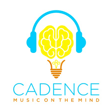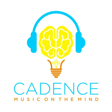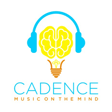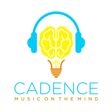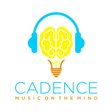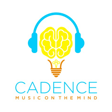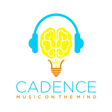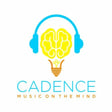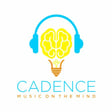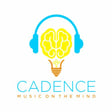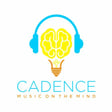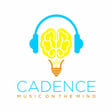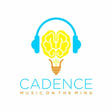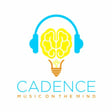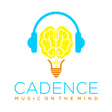Become a Creator today!Start creating today - Share your story with the world!
Start for free
00:00:00
00:00:01

S04 Episode 02: Connie Tomaino on Music Therapy and Parkinson's Disease
In a special series within season 4, Indre speaks with Connie Tomaino, executive director and co-founder of the Institute for Music and Neurologic Function (IMNF). This episode, Connie shares about the beginnings of her research in the clinical applications of music and neurologic rehabilitation, and the benefits of music and dance therapy for patients with Parkinson's Disease.
Cadence is the podcast where we talk about what music can tell us about the mind. Hosted by neuroscientist and musician, Dr. Indre Viskontas, the fourth season will bring you the stories of people who experience music outside the bounds of the average listener, and who use music as a tool to be heard in a society in which they are often ignored.
Transcript
Introduction to Unique Music Experiences
00:00:05
Speaker
Welcome back to Cadence, the podcast where we explore what music can tell us about the mind. I'm Andrea Viscontis. This season on Cadence, we're telling the stories of people who experience music differently than the rest of us. Those who use music as a form of not only expression, but of communication, of a way to be heard by a society that ignores or outright silences them.
00:00:32
Speaker
We also want to explore the healing power of music by diving into the nuts and bolts of music therapy.
Interview with Connie Timano: Music's Healing Power
00:00:39
Speaker
So in four special episodes this season, I'm going to talk with the legendary Connie Timano, executive director and co-founder of the Institute for Music and Neurologic Function in New York. Let's go back to the beginning.
00:00:57
Speaker
My aspiration since I was a little kid was to become a medical doctor. I mean, ever since I was two years old, I think that's the only thing I thought about. And I ended up becoming like a real science geek all through school, high school, ran the chem lab and the biology labs and things like that. But I was also a musician. I took accordion lessons as a young kid and then played trumpet in high school. And when I went to college, I started as a pre-med student at Stony Brook.
00:01:25
Speaker
in New York. But somewhere in my junior year of college, I found out about this field called music therapy from a magazine I had never heard of it before. And I was wondering, is it really possible if I could combine both my loves for music and medicine in one career, which would be wonderful. Music therapy for decades was one of the only ways that musicians could combine music with medicine.
00:01:52
Speaker
But it's not just about performing for patients. There was a new brand new master's program at NYU that was also approved music therapy program and so ended up doing my master's in music therapy. A lot of music therapy training is really related to psychotherapy and about the interpersonal aspects of music and how it can unfold some of these issues related to the mental health and wellness.
00:02:20
Speaker
The therapy part of music therapy is more like the one-on-one client to practitioner model of psychotherapy than it is like other therapeutic tools that might be less tied to the individual person, like a drug or surgery.
Transformative Music Therapy Experiences
00:02:36
Speaker
But then my clinical placement ended up being in a skilled nursing facility where there were people within stages of Alzheimer's disease who were basically non-responsive. And in fact, I tell the story all the time because it's so dramatic how a group of people will label this having no brains and being non-responsive. And the staff telling me that, you know, we just feed and water them because they don't know what's going on.
00:03:02
Speaker
And here I am in my first placement as a music therapist and saying, well, can music help? Can they hear this? And I start playing guitar and singing the song. And these people were screaming and agitated and otherwise, you know, some were catatonic, non-responsive. But as soon as I started singing this familiar song, the people who were agitated stopped.
00:03:28
Speaker
People who were seemingly non-responsive opened their eyes and half of them started singing the words to this song. And so this is where my science geek brain comes in. How can somebody with no brain function, according to the staff?
00:03:44
Speaker
a process sound and recognize that there's something familiar. Does music hold some key to forming connections to people who otherwise can't be reached? And so that was in 1978.
Oliver Sacks and the Foundations of Music Therapy
00:03:58
Speaker
And it was not until two years later that I came to Beth Abraham where Oliver Sacks was working. And he had had a similar experience with people who couldn't move because of a Parkinson's type of problem.
00:04:13
Speaker
Oliver Sacks is another legend among neuroscience geeks. He was a motorcycle riding bearded rebel who got thrown out of the lab because he cared too much about the things that most of us ignore, like the forgotten patients in a psychiatric institution.
00:04:30
Speaker
There, he administered L-DOPA, a revolutionary drug for Parkinson's disease, to patients who had the mysterious sleeping sickness, which left them unresponsive and seemingly perpetually asleep. They had Parkinsonian-like symptoms, and so Oliver wondered whether this new drug for Parkinson's might help them. Well, it was miraculous. Patients who had been catatonic for decades suddenly woke up and began to live again.
00:05:00
Speaker
Oliver, of course, when he wrote Awakenings, he was ostracized by the medical community. They thought this was all fiction. Nobody had ever seen anything. They thought that he made the cases up and he exaggerated the responses. And it wasn't until a colleague in the UK, I think, who had a similar experience backed Oliver's story up and said, no, this is true. This really happens.
00:05:23
Speaker
His gift, even back then, was in these very elaborate case studies and medical notes that became a foundation for understanding how music can then influence some of this function. Oliver took copious notes. He wrote, actually, about his compulsion to write. And he was prolific, not just in the many books that hit the bestseller lists, but in all the material that never made it to the public.
00:05:51
Speaker
There are boxes and boxes of yellow line notepads filled with his thoughts.
00:05:56
Speaker
I'm not even at the facility a week or two, and I get an into office envelope, you know, one of those brow manila envelopes. And inside there's a torn off piece of loose leaf paper, just like a corner of a pad that was torn off in a felt tip marker, this phrase from the ballist that every disease is a musical problem, or every illness is a musical problem, every cure a musical solution. Welcome, Ollie. And I'm thinking, who is this, you know?
00:06:25
Speaker
And how does he know I'm here? This was the beginning of one of Oliver's closest friendships. So then, of course, everybody said, well, this is, you know, our neurologist is sort of this quirky guy. He's very shy and sort of a social. But he made this documentary, I guess the BBC documentary had just been made two years before I got there. And so he sort of had a little bit of fame amongst the staff.
00:06:51
Speaker
So I had to find out who he was and introduce myself. Somebody I had just started working with outside his office that I introduced myself and showed him how the person was responding to music. Oliver goes, show me more. Tell me more about this. And so that started our long lasting friendship. Connie and Oliver were kindred spirits, not just in their reverence and appreciation for the role that music could play in medicine,
00:07:17
Speaker
but also in their pioneering rebelliousness. Using music as a tool to diagnose or treat patients would get you laughed out of any grand rounds. Of course, I couldn't believe that there was a doctor who actually was interested in music, let alone a neurologist that had this fascination with what was going on. And so immediately I felt that, you know, I had an advocate and plus the fact that he was a neurologist, he can help me understand some of the science. So Connie and Oliver started hanging out.
00:07:47
Speaker
He had just bought a house on City Island and I lived close by. And so he would invite me over in the evening and would share all the neurology. We would talk about different observations I would make in my groups. And that actually helped him with his neurology assessment because some of these things weren't within his toolkit to look at things like attention or understanding or motor control because he would test reflexes but couldn't really see sort of pre-engagement
00:08:16
Speaker
That's really missing out on what makes music so special, how it engages us even when other efforts to communicate fail.
Challenges in Neuroscientific Validation of Music Therapy
00:08:24
Speaker
I was the one in the music therapy field saying we have to talk to a neuroscientist. Who are the people studying this? Can they help us understand why music therapy is so effective or why music can not only excite responses in people who seem unresponsive,
00:08:40
Speaker
But can it alter then lead to changes that can promote some kind of restoration of function if that's possible, but maybe maintaining function for a longer period of time? And so that's back in the 80s, trying to find a neuroscientist who could answer some of those questions was really hard. Because most people were doing either cellular work, or they were looking at very specific things like cochlear hair cells and auditory stimulation, but not music per se, not the complexity of music.
00:09:10
Speaker
Music therapy wasn't always a respective field within the medical community. There's still some stigma in certain circles. The idea that you can't measure our responses to music or track the outcomes of music therapy makes some people skeptical that it's at all effective or rigorous.
00:09:28
Speaker
And just like psychotherapy, where the individual approach is a critical part of its success, it's admittedly harder to prove than, say, running a randomized, double blind, placebo controlled trial. But over the last five years or so, we've made huge strides in both evaluating and tweaking music therapy to ensure its effectiveness. But it took decades. In the field of music therapy, just talking about music in the brain seems so far out.
00:09:57
Speaker
I find it really fascinating that you started out with this kind of strong psychotherapy approach and that that's still, I mean, I want to talk a little bit about sort of how that makes music therapy different from say other music-based interventions because there's this history of a therapeutic component between the client and the practitioner.
00:10:20
Speaker
Maybe you could just tell us a little bit more about how music therapy kind of became a field if it came out more of the psychotherapy side rather than something else. Yeah, you know, the history of music therapy in the United States actually had a couple of different branches. You know, there's the American Music Therapy Association will talk about the observations of doctors and nurses in VA hospitals.
00:10:45
Speaker
after World War II about the vets who were catatonic and non-responsive. And when bands used to come and entertain, the doctors and nurses would observe that people started tapping their foot and seemed to come to life, you know, and there was a question about that. But there were also people in special education who were using music with
00:11:05
Speaker
developmentally delayed children, people like Clive Robbins and Paul Nordoff in the UK that were using music and music type interventions and creative music and music improvisation to connect with kids who were along the spectrum, who were non-verbal, who could make their first verbal sounds through music.
Post-WWII Developments in Music Therapy
00:11:25
Speaker
So there were all these different areas of people in medicine talking about music and pain reduction or things like that. So they were like little snippets of where music was effective. And it was in the 1950s. They, a group, advocated for the development of a standard curriculum for the training of music therapists. And that's how the field started to progress from there with universities developing actual curricula and stuff.
00:11:51
Speaker
I think over the years, because of attention and information coming out of the field of music therapy because of publications or even out of music and medicine and nursing or whatever, there's some general understanding about how music can help people relax, how music and certain types of music can help with pain remediation. And so those are things that can be generalized to use by the public without any oversight of a therapist, because if it works for you, use it type of thing.
00:12:21
Speaker
Yeah, that's like the equivalent. We know it's effective, you know? Yeah. Take an aspirin, call me in the morning. Exactly. And so there's these sort of touching on the potential of music and health and the generic benefits of music in helping with stress reduction and some of the physiological states, involuntary states that we have that can be influenced by auditory stimuli.
00:12:46
Speaker
Where music therapy differs is music therapists are trained to assess how the tweak or manipulate the sounds, the rhythm, and the music to maximize whatever that goal is. So for somebody with Parkinson's disease, they could create a soundtrack for their walking if they know that a certain rhythm is going to help them to walk. If they heard about that, it's very easy to put on.
00:13:09
Speaker
their playlists and say, well, this song helps me walk better than this other song. And so it's that tweaking of the music in real time for a specific goal that makes something music therapy rather than music
Parkinson's Patients and the Benefits of Dance
00:13:22
Speaker
for general help. We covered a few cases of music therapy in season two of Cadence. And one of my favorite stories came from Mike Gable. Before Mike was diagnosed with Parkinson's disease, he never would have dreamed that he'd end up in a dance class. But
00:13:39
Speaker
I mean, I used to dance sort of 60s freestyle to rock and roll years ago to rock and roll, but no, I would have never gone to a dance class. I didn't see myself as much of a dancer. But all indications were that dance was a really great thing to try to do with Parkinson's and it was going to help me.
00:13:58
Speaker
My wife, who's a retired psychiatric social worker for 30 years. Privately, she was worried in advance without telling me that she was afraid if I saw all these people with Parkinson's and various stages of the illness, it would get more depressed. But I had the exact opposite reaction. When I got to the class, here were my people. Trammering, walking with difficulty, soft voices. There are a whole bunch of Parkinson's symptoms that you recognize once you have the illness. And it was a huge relief to be like in a safe place where everybody had the same problem.
00:14:27
Speaker
And it was a great, incredible instant empathy and solidarity and kindness in that class that really came through very quickly. So that was my initial experience with it.
00:14:38
Speaker
People with Parkinson's now are aware of dance and music and its effect and benefits. When I first started that, there was a question about whether music could actually help somebody with Parkinson's for the long term. Oliver used to use this quote from TSL, you are the music while the music lasts, because most doctors or even people playing music with certain populations would see an effect in that moment, but as soon as the music stopped, the effect was gone.
00:15:07
Speaker
Whereas a music therapist is able to work with somebody consistently over time in a very rigorous way, will actually see changes over time. And so when I was first working with some of the postencephalitic patients that Oliver had,
00:15:22
Speaker
These are people who started to improve over time. They started to move better. Their voices became clearer. And it was obvious that with prolonged engagement and using music to address motor function or communication, that there was carryover and there was the potential for this to improve.
00:15:38
Speaker
I spoke to a Parkinson's group in the 80s as well and actually the founder of that Parkinson's group is the person responsible for getting dance for Parkinson's created with the Mark Morris group. Now that's sort of a standard approach or program that many people at Parkinson's take advantage of.
00:15:56
Speaker
because of the research over the years and because of the availability of these programs and people at Parkinson's learning about it and knowing that it's as good as some of the standard rehab programs, people gravitate more to the arts-based dance programs than going to PT or OT.
00:16:14
Speaker
Why do you think that is? For one thing, music frees up people with Parkinson's and it allows them to be expressive and independent and it doesn't feel like a medical treatment and it tends not to be as repetitive and stuck and monotonous as some of the traditional rehab treatments. So I think the embodiment of movement and expression that also takes advantage of some of these mode of timing aspects of music enables the person to feel more in control.
00:16:44
Speaker
and also validates themselves as being able to express themselves in a free way. And I think that's why they gravitate to it. There is a neuroscientific reason why music might be especially useful for patients with Parkinson's disease. The disease causes neurons in a part of the brain called the substantia nigra to die.
00:17:13
Speaker
Those neurons are little neurochemical factories. They manufacture something called dopamine. It's a neurotransmitter used throughout the brain to motivate us and help us move, among other things. So the amount of this neurochemical in the brain of a patient with Parkinson's disease is reduced.
00:17:33
Speaker
Where does music come in? Well, when we listen to music, dopamine levels rise. That's why music moves us, literally. And music also helps us entrain our brain networks to the same frequencies, synchronize brain activity so that we can coordinate our movements. Very useful when a disease robs us of these abilities.
00:17:56
Speaker
Can you tell us a little bit about what are some of the things that a typical patient with Parkinson's has trouble with? What are some of the symptoms and how might music help that? It depends on the person. So most of the times it's slowness or trouble with gait in the sense that there may be a irregularity, maybe one foot drags a little bit more than the other. And because of that slowness and the irregularity, there's a risk of faults. There's issues with initiation, getting up from a seated position.
00:18:24
Speaker
basic things like that, being able to walk for a few blocks without freezing or getting stuck and being afraid that they're going to fall. So when they learn that listening or finding a rhythm that helps them walk actually can sustain that walking for an extended period of time without issues related to balance or dragging their foot, they immediately latch onto that because it works instantaneously and it's something that they can use every day.
00:18:52
Speaker
So it's usually finding these music-based tools that they can take home and use to help them maximize their function. Some people, as it progresses, have trouble with speech, where their speech can be very soft. And even though they think they sound loud and fine,
00:19:10
Speaker
People around them will say, speak up, speak up, I don't understand you. So singing and certain types of vocal exercises actually help with increasing the volume of their voice as well as help with some of the articulation and intelligibility of their voice. And so many times people will come for that.
00:19:30
Speaker
Most of the people I work with or have worked with who were recently diagnosed just want to maintain their abilities for a longer period of time before they're treated with medication. So many times I'll see a musician who wants to maintain their skills and their flexibility and finding out ways of using the rhythm and the way of thinking of approaching their music in the way that they can override the Parkinson's but sort of trick their brain to not slow down one arm or hand.
00:20:00
Speaker
more than the other and there's ways of looking at that and helping with that. So let's say a patient is newly diagnosed with Parkinson's disease and they find out that you actually have an opening in your calendar and they make an appointment. What happens at that appointment?
00:20:17
Speaker
So first I asked them what they're challenged with and why they came, of course, what they want to work on. But then I have them walk. If the person has trouble walking, will do some movement exercises, I'll create playlists for them based on what helps them walk the best. If they're having trouble with on and off times with medication, we may create a playlist of some music that helps with their transition so it's not so sudden. So if they're starting to freeze up a bit, there may be some kind of pulse type related music that'll help
00:20:46
Speaker
carry them over so they could walk before the medication kicks in. Some of them have sleep problems where they get really, really restless during the night and we may create, find some music that helps and train them to a very long relaxed state and so that helps. We'll do vocal exercises if there's issues with the voice.
00:21:04
Speaker
And usually if their care partner is with them, the spouse child, they spend most of their time with, I'll allow that person to be there too so they can pick up on some of the techniques and use them every day. So it's something that's really accessible to the individual. And remember that music can help synchronize brain regions and get us going.
00:21:24
Speaker
There's several different studies, some that show responses in cerebellar functions, the cerebellum, and basal ganglia turned on all these precursors to motor excitement. And science has shown us that there's an entrainment between the auditory system, auditory nerves, and this network of premotor and the execution of motor or the actual
00:21:46
Speaker
active moving that are all connected and have strong connections to the auditory system. So we know that the pulses of sound that excite these networks, those pulses actually then also drive the actual pulses of movement and turn those on.
00:22:02
Speaker
And where it's beneficial is when somebody has cognitive slowness that's a higher cortical, higher mental process that people with neurologic diseases or any kind of slowness sometimes have trouble with motor planning or initiation. It's something that comes from a higher level, but we know they over a lifespan that these networks, these subcortical motor networks are then hardwired into action.
00:22:26
Speaker
and can be turned on through the auditory system without the person having to think about it. So it's almost like the automatic response of tapping your foot to music, things that we do habitually that we don't really think about that are driven by auditory stimuli. The science has proven that that is the case and that's very robust and long lasting.
00:22:46
Speaker
I can imagine a person who has Parkinson's where all of a sudden things that were automatic no longer are, that's jarring, that's upsetting because all of a sudden you pull the wool off of someone's eyes to show them how much of all the things they do actually rely on these pretty complex brain functions that now are affected.
00:23:05
Speaker
Right? Because they're thinking about it. Now that it's so hard to do, just like even picking up a cup, they have to figure out where their hand is in space or how to get them to move far enough to pick up the cup. That whole coordination may be affected. And so what music allows and what we do in music therapy is we try to get the person to this similar type of activity without thinking about what they're doing.
00:23:27
Speaker
So whether it's playing the drum to coordinate range of motion in their arm and just following the beat with that movement, the more flexibility and control they have over that movement in real time can then carry over to dressing themselves or to feeding themselves or drawing or doing whatever else they want to do. But it's getting that activity going on a regular basis and getting the electrical signals and dopamine running through those nerves again allows that to happen.
00:23:58
Speaker
Although there's now a wealth of evidence to prove that Parkinson's patients benefit greatly from music therapy, the medical system and insurance companies have a long way to go before they catch up.
Accessibility Issues in Music Therapy
00:24:11
Speaker
Right now, my institute, our clinic is private pay because we don't have the capability of billing insurance directly. So depending on the person's ability, we may do once a week, every other week, either virtually or in person.
00:24:26
Speaker
I do have a grant from the Parkinson's Foundation that is sponsoring a group-based program so that's something that happens live and online and that's free to participants. And if there was a way for insurance to cover this and I could see somebody every day, then the benefit would be that much greater because it's the type of thing where the music can help with every aspect of their flexibility and movement, but it's something that they have to learn how to use effectively.
00:24:53
Speaker
on a regular basis for there to be carryover. Because we know that with Parkinson's the more you move the better, the more dopamine you have available to you to be able to move. So that's the challenge. It's really the affordability and accessibility of it.
00:25:10
Speaker
It seems like the effects are pretty dramatic. It seems like they should be documentable, at least now, you know, as you've been doing research on this for so many decades. Why is it still something that insurance companies aren't immediately signing up to cover?
00:25:25
Speaker
Right. It's really a challenge. It really depends on the insurance plan, but the belief of music therapy were listed as one of the therapies on general insurance plans, Medicare, Medicaid type of thing. I think people would have more access to it because insurers then would recognize it as a professional treatment. Because like you said, there's enough research out there now that shows the efficacy.
00:25:51
Speaker
Connie is a national treasure, if you haven't realized that already, because she's been instrumental in showing how music can be used as medicine, how it can illuminate the complexity of the human condition and make our lives better. Throughout her career, she's uncovered many of its layers.
00:26:11
Speaker
When we first started to talk to neuroscientists back in the early 80s, I think what they were interested at the time was chaos theory and complex mathematics and thinking of music as algorithms of these complex interactions of sound and vibration and tone and time patterns, temporal patterns of sound.
00:26:30
Speaker
Somehow our brains put that together and allow us to experience a song as a melody and stuff. That kind of complexity meant that they had to understand how those systems in the brain communicated with each other. Because obviously every aspect of music wasn't just being processed in one part of the brain, there was multiple systems talking to each other and working together to make.
00:26:51
Speaker
that experience possible for us. So I think when we think about music and we think about systems working together in a very dynamic way, ALTA gives us a sense about how the human body works because technically it's all these systems that have to work in harmony and communicate with each other every aspect of our body to be in a healthy state.
00:27:23
Speaker
Season 4 of Cadence is created by me, Dr. Andre Viscontes. It is produced by Ireland Meacham and Matthew Rubenstein at Audiation. It is mixed by Matt Noble with music from Rian Sheehan from his album Stories from Elsewhere. You can find us online at cadence.show. You can also get in touch with us at cadencemind at gmail.com. You can find me on Twitter at Andre Viss. Cadence is generously supported by the Germanicos Foundation.
00:28:00
Speaker
Audiation.
